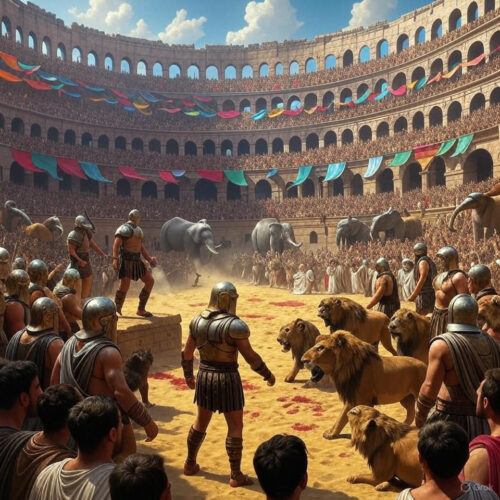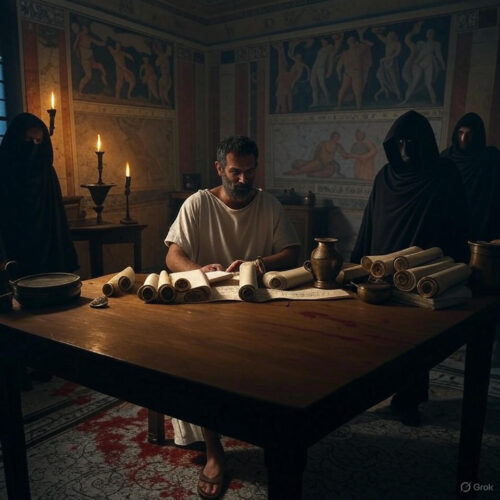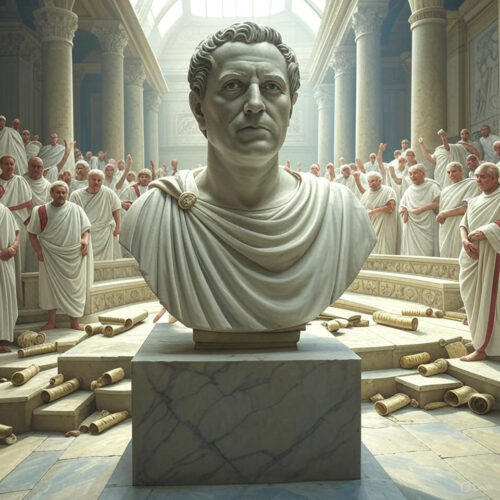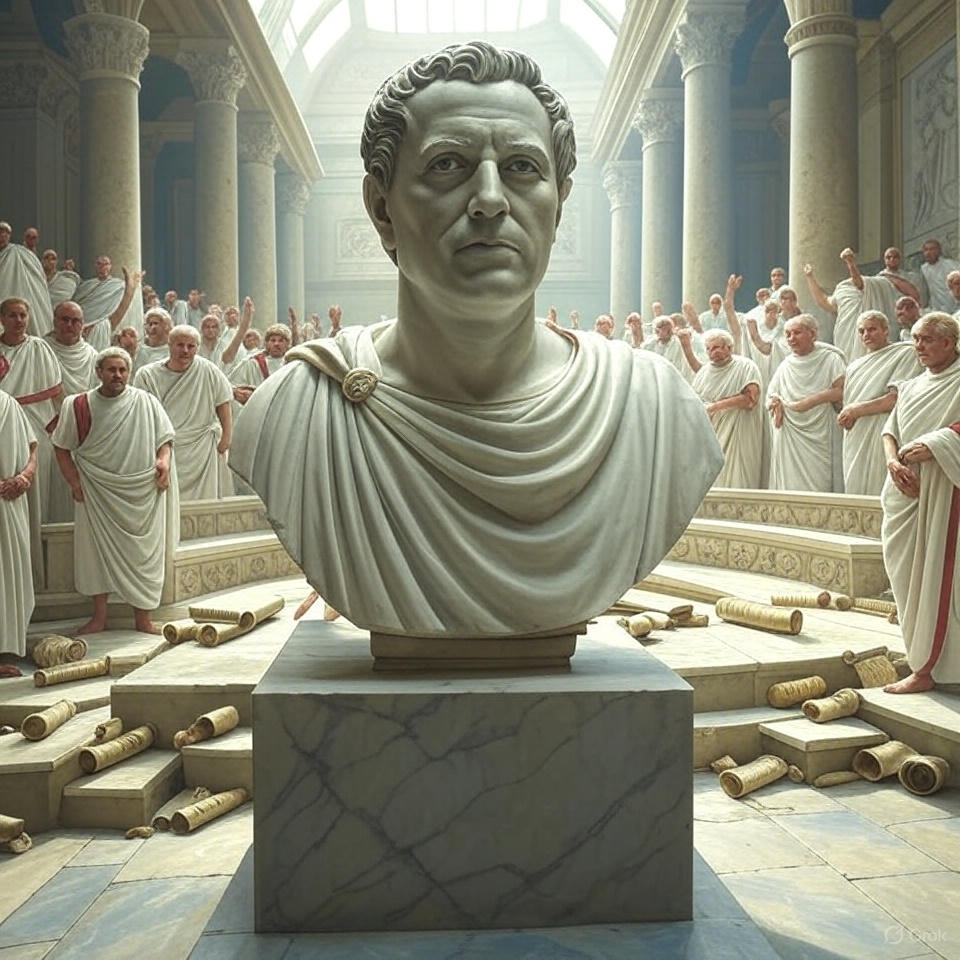The sun had barely crested the horizon on September 18, 96 AD, casting a golden hue over the sprawling palaces of the Palatine Hill in Rome. The Eternal City buzzed with its usual rhythm—merchants haggling in the Forum, senators whispering intrigues in the Curia, and slaves scurrying to fulfill the whims of the elite. But within the opulent halls of the imperial residence, a storm was brewing, one that would forever alter the course of the Roman Empire. On this fateful morning, Emperor Titus Flavius Domitianus, the last of the Flavian dynasty, met his end not on a distant battlefield, but in the very heart of power, slain by those closest to him. This was no mere regicide; it was the culmination of years of simmering resentment, a desperate bid to reclaim the republic’s spirit from the clutches of autocracy. Domitian’s assassination wasn’t just a bloody footnote in history— it was a seismic shift that ushered in an era of enlightened rule, reminding us that even the mightiest can fall when hubris blinds them to the winds of change.
To understand the gravity of that day, we must delve deep into the labyrinth of Roman history, tracing the threads that wove Domitian’s fate. Born in 51 AD as the younger son of Vespasian, the pragmatic general who rose to emperor during the chaotic Year of the Four Emperors in 69 AD, Domitian grew up in the shadow of his father’s military triumphs and his elder brother Titus’s charisma. Vespasian, a no-nonsense leader from the equestrian class, had stabilized the empire after the suicidal excesses of Nero, rebuilding Rome after the devastating fire of 64 AD and funding grand projects like the Colosseum with a tax on urine—a quirky detail that highlights his earthy pragmatism. Titus, the golden boy, commanded the legions that crushed the Jewish Revolt in 70 AD, sacking Jerusalem and bringing the Arch of Titus as a trophy to the city. Domitian, by contrast, was the overlooked sibling, often mocked as a “baldy” by contemporaries and sidelined during his family’s rise.
When Vespasian died in 79 AD, Titus ascended smoothly, ruling for just two years before succumbing to fever in 81 AD—some whispered poison, but history leans toward natural causes. Domitian, at 30, stepped into the purple robes, expecting adulation. Instead, he inherited an empire still scarred by civil war and external threats. The Danube frontier was ablaze with Dacian incursions under King Decebalus, who raided Roman provinces with impunity. Domitian responded with vigor, launching campaigns in 85 AD that pushed back the barbarians but at great cost. His legions, hardened by years of conflict, clashed in the forests and mountains of modern-day Romania, where the Roman short sword, the gladius, proved its mettle against Dacian falx—curved blades that could cleave a helmet in two. By 86 AD, Domitian had fortified the frontier with new legions, but victory came at the price of heavy casualties and strained treasuries.
Domitian’s early reign shimmered with promise. He completed the Flavian Amphitheater, now eternally known as the Colosseum, inaugurated in 80 AD with 100 days of games featuring exotic beasts from Africa and gladiators from across the empire. Imagine the roar of 50,000 spectators as venationes—wild animal hunts—unfolded, lions and elephants thundering across the sand-strewn arena. Domitian expanded the imperial palace on the Palatine, incorporating the Stadium of Domitian, a long, narrow track for foot races that could seat 30,000, blending Greek athletic ideals with Roman spectacle. He reformed the coinage, minting crisp denarii with his stern profile, and bolstered the Praetorian Guard, the elite protectors of the emperor, by raising their pay—a move that bought loyalty but sowed seeds of dependency.
Yet, beneath this veneer of stability, cracks formed. Domitian’s personality, forged in the fires of neglect, twisted toward paranoia and absolutism. Historians like Suetonius, writing decades later in his “Lives of the Twelve Caesars,” portray him as a man obsessed with flattery and divine status. He styled himself “Dominus et Deus”—Lord and God—demanding worship that echoed the excesses of Caligula and Nero. Temples to his own divinity dotted the landscape, and courtiers were compelled to address him with groveling obeisance. This wasn’t mere ego; it was a calculated assertion of power in an empire where the Senate still clung to republican pretensions. The senators, descendants of Rome’s ancient nobility, chafed under his rule. Domitian executed or exiled dozens, including his cousin Flavius Clemens in 95 AD on charges of “atheism”—a veiled accusation of Jewish sympathies or perhaps Christianity, though evidence is murky.
The year 89 AD marked a turning point. A revolt erupted in the legions of Saturninus, governor of Upper Germany, who sought to claim the throne amid rumors of Domitian’s death. Loyalist forces under Lascaris crushed it swiftly, but the incident fueled Domitian’s suspicions. He purged the military, executing officers he deemed disloyal, and intensified surveillance in Rome. Informers, known as delatores, proliferated, rewarded with the estates of the condemned. The philosopher Epictetus, a former slave, later recounted in his “Discourses” how Domitian’s reign turned friends into spies, eroding the social fabric. Even the Vestal Virgins, priestesses of Vesta sworn to chastity, weren’t spared; in 83 AD, Domitian buried three alive for alleged impurity, reviving an archaic punishment that sent shivers through the elite.
Externally, Domitian’s wars defined his legacy. The Dacian campaigns of 85-89 AD culminated in a treaty that ceded territory to Decebalus, a humiliation spun as peace but decried as weakness. In 92 AD, he invaded the Chatti tribe in Germania, earning the title Germanicus, but the campaign was more punitive raid than conquest. His greatest triumph came in 93 AD against the Marcomanni, but these victories masked deeper issues: the empire’s borders were expanding, but so were the costs. Taxes soared, alienating provincials, and grain shortages plagued Rome, leading to riots quelled by the Guard’s clubs.
By 96 AD, the palace was a powder keg. Domitian’s marriage to Domitia Longina, daughter of a consul, had soured. Rumors swirled of her affair with the actor Paris, whom Domitian had executed in a fit of jealousy around 83 AD, only to recall her from exile later. Their relationship, a toxic brew of passion and politics, simmered with resentment. Key players in the conspiracy included the Praetorian prefects, Ste Steptimius Magnus and Parthenius, who controlled access to the emperor, and possibly the chamberlain Abascantus and freedman Phoebe. Suetonius details the plot: assassins armed with a dagger inscribed with “our fates are upon you” waited in the shadows.
The morning unfolded with eerie normalcy. Domitian, rising early, called for his daily bath—a Roman ritual of oiling and scraping the skin with a strigil. As he sat in his bedroom, perusing accounts (some say a list of names for execution), the killers struck. According to Cassius Dio, a Greek historian writing in the 3rd century, Domitian fought back fiercely, killing one assailant before being overwhelmed. Seven wounds pierced his body, including a fatal stab to the neck. Blood stained the marble floors, and his last words, legend has it, were a curse upon his murderers. The time was the fifth hour, around 11 AM, under a sky heavy with autumn clouds.
News spread like wildfire. The Senate, sensing opportunity, rejoiced openly, hailing the dawn of a new era. Nerva Cocceius, an elderly senator of consular rank, was proclaimed emperor that very day, a puppet of the conspirators at first but a bridge to reform. Domitian’s body was hastily cremated, his ashes interred in the Temple of the Flavian Gens by his nurse, Phyllis, who later scattered them in the urn. The Senate decreed damnatio memoriae—erasure from history—chipping his name from inscriptions and melting his statues. Yet, traces lingered: coins bore his image, and his architectural legacy endured.
The aftermath rippled through the empire. Nerva’s brief reign (96-98 AD) was a tentative step toward senatorial restoration, pardoning exiles and curbing informers. But it was under Trajan, adopted by Nerva in 97 AD, that the “Five Good Emperors” era began—Trajan, Hadrian, Antoninus Pius, Marcus Aurelius, and Commodus (until his fall). This adoptive succession stabilized Rome for nearly a century, fostering the Pax Romana’s zenith. Economically, Domitian’s infrastructure—roads, aqueducts like the Aqua Traiana’s precursor—supported trade from Britain to Egypt. Militarily, his frontier policies influenced Hadrian’s Wall. Culturally, his patronage of poetry, though laced with censorship, preserved works by Statius and Martial, who navigated flattery and fear in their verses.
Domitian’s rule, for all its darkness, wasn’t unmitigated tyranny. He quelled piracy in the Mediterranean, reformed the judicial system, and promoted equestrian advancement, democratizing the bureaucracy. His devaluation of the denarius in 85 AD, reducing silver content to fund wars, was pragmatic economics, though it spurred inflation. In Judea, he suppressed lingering revolts, maintaining order in a volatile province. Yet, these achievements were overshadowed by his autocracy. Tacitus, in his “Agricola,” laments the stifled oratory and the fear that choked free speech, writing, “Under Domitian, we were reduced to silence.”
Diving deeper into the socio-political fabric, Domitian’s era reflected Rome’s evolving identity. The Flavian dynasty, rising from the ashes of Nero’s suicide in 68 AD, represented merit over bloodline. Vespasian’s tax reforms, including the vectigal on publicans, funded the empire’s grandeur. Domitian continued this, imposing a 5% inheritance tax on non-citizens, swelling the treasury. But his personal extravagance—banquets with gold plate and rose-petal ceilings—contrasted sharply with Vespasian’s frugality. The palace, expanded to include cryptoporticus tunnels for private wanderings, symbolized isolation from the people.
The conspiracy’s roots trace to 95 AD’s purges. Flavius Clemens’s execution, alongside his wife Flavia Domitilla (Domitian’s niece), on charges of conversion to Judaism or Christianity, alienated the Jewish and early Christian communities. Clemens’s vast estates were redistributed, fueling greed among courtiers. Parthenius, master of the emperor’s bedchamber, stood to gain from the chaos. Domitia, if involved as ancient sources like Suetonius claim, may have sought revenge for past humiliations, including Domitian’s infidelities with Julia Flavia, Titus’s daughter, whose death in 91 AD from abortion (ordered by Domitian) haunted the court.
Post-assassination, the Praetorians initially supported the plotters, but tensions arose. Nerva’s inability to punish the killers led to a mutiny in 97 AD, where soldiers demanded justice; Nerva yielded, adopting Trajan to appease them. Trajan’s accession in 98 AD brought military prowess—conquering Dacia fully in 101-106 AD, annexing its gold mines that minted the empire’s wealth. Hadrian’s travels (117-138 AD) consolidated borders, while Antoninus Pius’s reign (138-161 AD) emphasized justice, codifying laws that influenced later Roman jurisprudence.
Marcus Aurelius (161-180 AD), the philosopher-king, penned “Meditations” amid plagues and wars, echoing Stoic resilience against tyranny’s lessons. Commodus’s descent into madness in 192 AD ended the golden age, but the 84-year interlude shaped Western civilization. Roman engineering—Domitian’s roads facilitated the spread of ideas, from Stoicism to Christianity. Legally, his precedents informed the Twelve Tables’ evolution into Justinian’s Code in the 6th century.
In the provinces, Domitian’s impact varied. In Britain, his governor Agricola expanded northward, nearly reaching Scotland, as Tacitus detailed. In Asia Minor, earthquakes in 92 AD prompted relief efforts, showcasing administrative efficiency. Numidia’s olive oil trade boomed under stable frontiers. Yet, his coinage reforms, introducing the aureus at 1/40th pound, stabilized commerce until debasement accelerated under later emperors.
The cultural milieu was rich yet repressive. Martial’s epigrams praised Domitian’s hunts but subtly critiqued excess, surviving censorship. Statius’s “Silvae” lauded the emperor’s villas, blending flattery with artistry. Theater flourished, with pantomime dancers captivating audiences, though Domitian banned certain troupes for moral reasons. Astronomy advanced; he corresponded with Pliny the Younger, whose “Natural History” (completed under Trajan) drew on Flavian observations.
Religiously, Domitian enforced the imperial cult, persecuting those who refused sacrifice—early Christians like those in Revelation’s “Beast” imagery may reference him. Yet, he restored temples to Jupiter and Minerva, his patroness, integrating old gods with his divinity.
Now, as we emerge from this historical tapestry, consider how Domitian’s fall illuminates paths for personal empowerment today. The outcome— the overthrow of a tyrant leading to a renaissance of wise leadership—teaches that vigilance against overreach, whether in one’s life or society, can spark renewal. By applying this, individuals can cultivate resilience, strategic alliances, and ethical fortitude to navigate modern challenges.
– **Embrace Vigilance Against Personal Tyranny**: Just as Domitian’s paranoia isolated him, recognize when your own habits—procrastination, self-doubt, or toxic relationships—act as internal despots. Start by journaling daily for 10 minutes, noting patterns that drain your energy, much like senators tracked imperial whims. This awareness prevents self-sabotage, fostering proactive change.
– **Build Strategic Alliances Like the Conspirators**: The plot succeeded through trusted insiders; in your career or social circle, identify mentors and peers who share your vision. Attend one networking event monthly, targeting professionals in your field, and follow up with personalized notes. This network becomes your Praetorian Guard, amplifying opportunities during crises.
– **Cultivate Ethical Leadership to Avoid Damnation**: Domitian’s damnatio memoriae erased his name; ensure your actions leave a positive legacy by volunteering 5 hours weekly at a community cause, aligning decisions with core values. Track progress in a leadership log, reflecting on how choices impact others, building a reputation that endures.
– **Harness Resilience in Adversity**: Domitian’s wars built empire but broke him; face personal battles—job loss, health issues—with Stoic endurance. Adopt a routine: 20 minutes of meditation daily, drawing from Marcus Aurelius’s principles, to reframe setbacks as temporary, turning potential defeats into growth.
– **Plan for Succession and Renewal**: Nerva’s adoption ensured continuity; in your life, create a “legacy blueprint” outlining goals for the next 5 years, including skill-building courses (e.g., online leadership training) and emergency funds covering 6 months’ expenses. Review quarterly, adapting like Trajan’s reforms, to sustain long-term success.
To implement this plan: Week 1, audit your “imperial court”—list allies and eliminate drains. Month 1, establish routines for vigilance and resilience. Quarter 1, engage in alliances and ethical acts. Year 1, refine your blueprint, celebrating milestones with a personal “triumph” like a solo adventure. This structured approach transforms historical wisdom into daily empowerment, proving that the echoes of 96 AD can fortify your journey.

